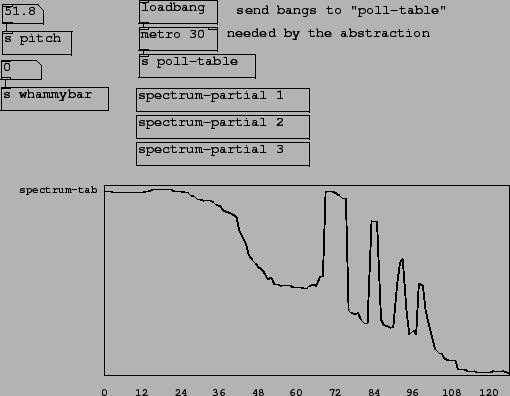 |
The next patch example, D08.table.spectrum.pd(figure 4.18), shows a very different application of additive synthesis from the previous patch. Here the sinusoids are managed by the spectrum-partial.pd abstraction shown in figure 4.19. Each partial computes its own frequency as in the previous patch. Each partial also computes its own amplitude periodically (when triggered by the r poll-table object), using a tabread4 object. The contents of the table (which has a nominal range of 50 dB) are converted to linear units and used as an amplitude control in the usual way.
A similar example, patch D09.shepard.tone.pd(not pictured), makes a Shepard tone using the same technique. In this example the frequencies of the sinusoids sweep over a fixed range, finally jumping from the end back to the beginning and repeating. The spectral envelope is arranged to have a peak at the middle of the pitch range and drop off to inaudibility at the edges of the range so that we hear only the continuous sweeping and not the jumping. The result is the famous auditory conundrum of an infinitely ascending or descending tone.
The general technique of synthesizing to a specified spectral envelope can be generalized in many ways: the envelope may be made to vary in time either as a result of a live analysis of another signal, or by calculating from a set of compositional rules, or by cross-fading between a collection of pre-designed spectral envelopes, or by frequency-warping the envelopes, or in many other ways.